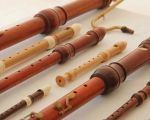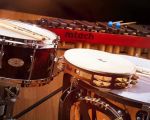Best String Instruments for Beginner Musicians
As a beginner musician, choosing the right string instrument is essential for both your learning experience and long-term enjoyment. Having tried various instruments myself, I know how challenging it can be to decide which one to start with. Whether you're drawn to the soothing sound of a violin, the rhythmic strumming of a guitar, or the deep tones of a cello, it's important to choose wisely based on your preferences, budget, and goals. Let's dive into some of the best string instruments for beginners and explore their unique qualities.
1. The Violin: A Classic Choice for Beginners
The violin has long been a favorite string instrument, and for good reason. It's versatile, relatively affordable, and suitable for players of all ages. As a beginner, I found that the violin allows for a great deal of expression, from dramatic concertos to soft, melodic pieces. The violin's small size makes it easy for young learners to handle, but it requires a good amount of technique and practice to master.
For those just starting, a full-size violin may seem intimidating, but there are plenty of options available in half sizes for younger children or those with smaller hands. Additionally, learning the basics of bowing technique and finger placement can be an exciting challenge for new players.
2. The Guitar: The Perfect All-Rounder
If you're looking for an instrument that is both popular and beginner-friendly, the guitar might be your best bet. I remember when I first picked up a guitar, the accessibility of learning basic chords made it feel like a huge milestone. Whether you're interested in rock, folk, or classical music, the guitar can adapt to nearly every genre. It's also one of the most affordable string instruments, with a variety of options for all budgets.
For beginners, I recommend starting with an acoustic guitar. The learning curve is gentle, and the instrument doesn't require an amplifier. It’s also an excellent choice for solo performances or jam sessions with friends. In terms of maintenance, guitars are relatively easy to keep in tune and can last for many years if taken care of properly.
3. The Cello: For Those Who Want Deep, Rich Tones
If you're drawn to the deep, resonant tones of the cello, it's definitely worth considering. While the cello may seem intimidating due to its size and complexity, it’s a beautiful instrument that can provide a sense of accomplishment once you get the hang of it. In fact, many professional musicians consider the cello to have one of the most expressive voices among all string instruments.
For beginners, it’s important to keep in mind that learning the cello requires significant hand strength and posture control. But with the proper technique and practice, it can become a rewarding musical journey. The cello is also unique in that its range can mimic the human voice, making it perfect for beginners who love classical music or orchestral works.
4. The Ukulele: A Fun and Accessible Option
For those seeking a more lighthearted introduction to string instruments, the ukulele is a fantastic option. This small, four-stringed instrument is known for its bright, cheerful sound and ease of learning. I personally found it to be incredibly fun to play, especially for beginners. The ukulele’s small size and fewer strings make it less daunting than other instruments, and within a short amount of time, beginners can master basic chords and start playing simple songs.
The ukulele is an affordable instrument, making it a great choice for those who want to dip their toes into the world of string instruments without committing to a larger, more expensive instrument. Plus, it's highly portable and ideal for playing with friends or at social gatherings.
5. The Mandolin: For Beginners Who Love Folk Music
The mandolin, with its bright, plucky sound, is often associated with folk, bluegrass, and classical music. I have always enjoyed the distinctive sound of the mandolin, which provides a perfect blend of harmony and rhythm. Though it may seem intimidating due to its small neck and multiple strings, the mandolin is a rewarding instrument for those who are committed to learning it.
For beginners, it’s helpful to start with basic chords and strumming patterns before diving into more complex techniques like tremolo. The mandolin is also great for players who enjoy fast-paced music, as it allows for quick note transitions and intricate melodies.
6. The Double Bass: For Larger-Scale Music Lovers
If you're interested in deeper tones and larger-scale performances, the double bass may be an ideal instrument to consider. The double bass is known for its massive size and rich, low-end sound, often used in orchestras, jazz bands, and even rockabilly music. While its size can be daunting at first, the double bass is incredibly rewarding for those who want to stand out and make a bold musical statement.
Learning the double bass can take time, as it requires strength and control to maneuver the bow and fingers across its larger strings. However, once you develop proficiency, the double bass can serve as a beautiful foundation for many different styles of music.
Choosing the Right Instrument for You
Choosing the best string instrument for a beginner ultimately depends on your personal preferences and the music you want to create. Consider factors such as size, sound, maintenance, and the type of music you want to play. It’s also essential to be patient with your progress, as learning any musical instrument takes time and effort.
Whether you're drawn to the violin's elegance, the guitar's versatility, or the ukulele's cheerful tones, each instrument offers unique opportunities for growth and expression. The key is to find one that resonates with you and allows you to enjoy the process of learning and playing music. And remember, no matter which instrument you choose, the most important thing is to have fun and enjoy the journey of becoming a musician.








